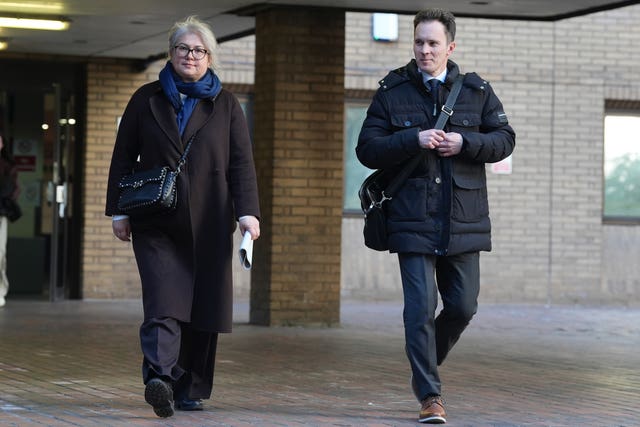Trial of former Russian minister ‘not about Vladimir Putin’, jurors told
Dmitrii Ovsiannikov is facing seven counts of circumventing sanctions in the UK.

The trial of a former Russian minister accused of breaching sanctions in the UK is “not about Vladimir Putin” or the war in Ukraine, jurors have been told.
Dmitrii Ovsiannikov, 48, the former mayor of Sevastopol in illegally annexed Crimea, is facing seven counts of circumventing sanctions between February 2023 and January 2024.
He is said to have deliberately avoided sanctions by opening a Halifax Bank of Scotland (HBOS) account on or before February 2023 and having tens of thousands of pounds transferred to it by his wife, Ekaterina Ovsiannikova, who is facing four counts of breaching sanctions by assisting with the payments totalling £76,000.
During closing arguments on Thursday at Southwark Crown Court, his defence barrister, Rosemary Davidson, told jurors that the case is not about the war in Ukraine or Ovsiannikov’s work as governor of Sevastopol.
Ms Davidson said: “It may be that you have strong views about this, or not. But it is not about that.
“Nor is this case about Vladimir Putin.”
She noted that a column of evidence on the Russian leader had been presented, but added “you have heard almost nothing about him, that’s because this case is not about him” or his appointment of Ovsiannikov as governor.
Evidence in the case has been accepted but the lawyer representing Ovsiannikov, who has not given evidence, denied it amounts to the charge.
The sanction breach charges allege he “intentionally participated in activities… knowing that the object or effect of the activities was to circumvent, or to enable or facilitate the contravention of financial prohibitions”.
It has been argued that Ovsiannikov was unaware of the sanctions imposed on him in the UK, which included an asset freeze, and did not intentionally circumvent them.
This was shown by there being “nothing to suggest that he took any steps to hide what was he doing”, Ms Davidson said.
In one example, Ms Davidson questioned why Ovsiannikov would open a bank account at a “well-known high street bank” if he believed he could be blocked from doing so or that his money may eventually be frozen.
He used his bank card in numerous traceable transactions and gave his name and address to other vendors when required, she added.
“This is not someone squirreling it away or taking out large quantities of cash”, she told jurors.

It had been claimed Ovsiannikov “was flying under the radar, but in fact the evidence shows that he repeatedly made contact with various authorities”, she said.
During his closing argument earlier, prosecutor Paul Jarvis reminded jurors that on February 7 2023 Ovsiannikov contacted the Foreign, Commonwealth and Development Office (FCDO) requesting his sanctions in the UK be revoked.
His European Union prohibitions were lifted the day before the email was sent.
He also applied for the Halifax account on February 6, which was the first charge on the indictment.
At that point, “he was living with his family in harmony, living in Ekaterina’s five-bedroom house” in Clapham, south London, Mr Jarvis said.
This included his wife and his brother, Alexei Owsjanikow, who is also on trial.
Mr Jarvis said “the reality is that everybody knew” about the UK sanctions.
He added: “The defendants are connected not just as family, but because they live together. You see a degree of financial dependence on each other.”
None of them can claim “we are ships in the night”, “we hardly see each other” or that they “lived in this bubble of ignorance”, the prosecutor told jurors.
Ovsiannikova is facing four counts of breaching sanctions by assisting with payments.
Owsjanikow, 47, has denied circumventing sanctions to buy him a Mercedes Benz worth £54,500, as well as spending £41,027 on fees at the Royal Russell School in Surrey for Ovsiannikov’s children.
Ovsiannikov also denies one count of using criminal property and one of possessing criminal property.
The latter charge relates to the £76,000 transactions.





